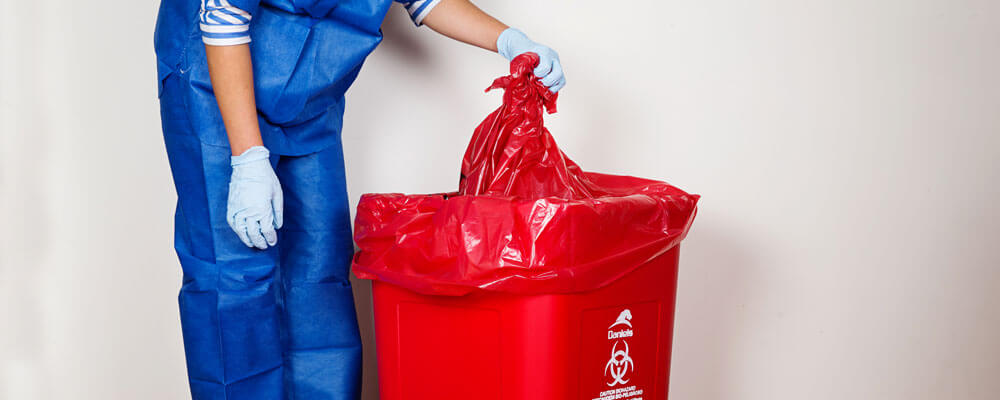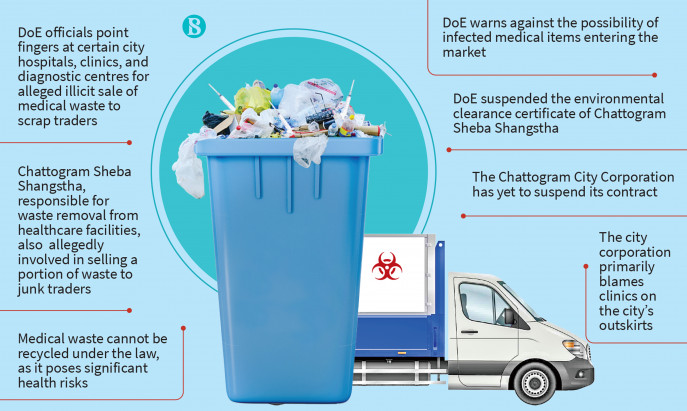Safety and security First: Your Overview to Accountable Medical Waste Removal Services
Stay Compliant and Safe: How to Deal With Medical Waste Correctly
In today's ever-changing healthcare landscape, guaranteeing compliance and security when it comes to clinical waste disposal is of utmost relevance. In this discussion, we will explore the different types of medical waste, the connected dangers, the lawful needs, and the ideal techniques for keeping a certified and risk-free clinical waste administration system.
Relevance of Correct Clinical Garbage Disposal
Proper medical waste disposal is of utmost importance in guaranteeing the safety and well-being of both healthcare employees and the basic public. Clinical waste, that includes products such as used needles, contaminated dressings, and expired drugs, postures severe health and wellness dangers if not handled and dealt with correctly.

Moreover, incorrect disposal of medical waste can lead to ecological contamination. When clinical waste is not segregated, treated, or disposed of appropriately, it can locate its method into landfills or bodies of water, possibly contaminating the air, water, or soil sources. This can have detrimental results on environments and human health and wellness, as dangerous substances might leach right into the atmosphere or be released right into the environment.
Types of Clinical Waste and Their Risks
The varied variety of medical waste created by health care facilities provides various threats that need to be thoroughly resolved to guarantee proper disposal and stop potential injury to public health and the setting. Medical waste can be identified into various categories based upon its characteristics and degree of risk.
One sort of medical waste is contagious waste, which includes products that are infected with blood or other possibly infectious materials. This can consist of used needles, syringes, and various other sharp things, in addition to cells, swabs, and dressings from clients with infectious conditions. Inappropriate disposal of transmittable waste can lead to the transmission of unsafe virus and the spread of infections.
Another category is contaminated materials, that includes materials that are poisonous, flammable, destructive, or responsive. This can consist of chemicals, pharmaceuticals, and specific clinical tools. Mishandling or incorrect disposal of unsafe waste can result in environmental contamination and present threats to the wellness of waste workers and the public.
Contaminated waste is an additional sort of medical waste that should be meticulously taken care of. This waste includes materials that include radioactive compounds, such as made use of radiation treatment resources or infected laboratory supplies. Improper handling or disposal of radioactive waste can result in radiation exposure and major health and wellness dangers.
Finally, non-hazardous basic waste, such as paper, product packaging materials, and food waste, is likewise produced by health care facilities. While this waste may not position considerable risks, it still needs to be correctly handled to maintain cleanliness and avoid the attraction of pests.
To ensure the safe disposal of clinical waste, medical care centers need to carry out appropriate segregation, storage space, transport, and therapy approaches. This includes using suitable containers, labeling, and training for team, along with adhering to local regulations and standards. By attending to the dangers related to various sorts of medical waste, medical care facilities can protect public wellness and the atmosphere.
Regulatory and lawful Demands for Disposal
In order to ensure the secure and appropriate disposal of medical waste, medical care facilities have to adhere to lawful and regulative try here requirements. These needs are in location to protect public health and wellness and the environment from the prospective hazards connected with medical waste. Clinical waste is classified as an unique group of waste because of its possible to transmit contagious diseases and consist of damaging materials.

Some typical needs consist of the partition and proper packaging of clinical waste, making use of accepted labels and containers, and the application of secure handling and transport treatments - medical waste removal service. Health care centers might additionally be called for to keep records of their waste management practices and offer paperwork to regulative authorities upon demand
Failing to abide with these lawful and governing needs can cause fines, penalties, and reputational damages for medical care centers. It is, consequently, crucial for healthcare service providers to prioritize compliance and develop durable waste monitoring methods to make sure the risk-free and appropriate disposal of medical waste.
Best Practices for Safe Medical Waste Monitoring
Medical care centers need to follow industry best techniques to make certain the secure and efficient monitoring of clinical waste - medical waste disposal services with WasteX. Applying these best techniques not only aids safeguard the setting and public health yet also minimizes the risk of prospective lawful and financial effects
One of the crucial ideal practices is the correct segregation and containment of various types of medical waste. This entails using color-coded containers and clearly classifying them to ensure that each type of waste is disposed of properly. In addition, healthcare facilities must have marked areas for storage and disposal of medical waste, with clear standards and treatments in place.
One more crucial facet of safe medical waste administration is the training and education and learning of healthcare personnel. All workers that take care of medical waste ought to get thorough training on the correct handling, storage, and disposal procedures. It is important to make sure that team participants recognize the potential threats related to medical waste and are outfitted with the essential expertise and abilities to manage it securely.
Normal surveillance and bookkeeping of waste monitoring techniques is additionally essential. This involves frequently evaluating waste administration procedures, carrying out evaluations, and maintaining accurate records. By keeping track of waste management practices, healthcare centers can recognize any kind of prospective problems or webpage areas for improvement and take rehabilitative activities appropriately.
Finally, healthcare centers need to focus on making use of eco-friendly disposal approaches whenever possible. This includes making use of waste therapy innovations such as autoclaving or incineration, which can help lower the quantity and dangerous nature of medical waste.
Eco-Friendly Solutions for Medical Garbage Disposal
Executing environmentally friendly solutions for clinical waste disposal is crucial for medical care facilities to minimize ecological impact and make certain lasting practices. Typical techniques of clinical waste disposal, such as incineration and landfilling, have actually been discovered to launch dangerous pollutants right into the air and contaminate dirt and water sources. Consequently, there is a growing demand for alternate approaches that are both eco friendly and secure.
These systems utilize sophisticated technologies to safely refine clinical waste within the medical care facility itself. By treating the waste on-site, transport exhausts and threats associated with off-site disposal are decreased.
One more green approach is the fostering of recycling programs for sure kinds of clinical waste. Products such as glass, plastics, and steels can be recycled rather than disposed of in garbage dumps. By carrying out partition and reusing programs, medical care centers can dramatically reduce their waste volume and decrease their environmental footprint.
Additionally, health care centers can check out making use of recyclable clinical devices and materials. By selecting recyclable products, rather than single-use alternatives, the amount of waste generated is significantly reduced. Multiple-use things can be decontaminated and made use of several times, leading to expense savings and much less ecological effect.
Verdict
In verdict, proper disposal of medical waste is essential for maintaining conformity and making certain security. Comprehending the sorts of clinical waste and their connected dangers is essential in order to apply the ideal disposal techniques. Adhering to regulatory and lawful demands is essential for staying clear of check it out charges and protecting the setting. Complying with best techniques for safe clinical waste administration and exploring green services can add to a accountable and sustainable technique to waste disposal in the medical care industry.
In this discussion, we will certainly explore the various kinds of clinical waste, the associated dangers, the lawful needs, and the best methods for keeping a safe and compliant clinical waste management system - medical waste removal.One type of clinical waste is transmittable waste, which includes items that are polluted with blood or various other possibly transmittable products.Radioactive waste is another type of medical waste that need to be meticulously taken care of. Clinical waste is classified as a special category of waste due to its potential to transmit infectious diseases and include dangerous materials
Adhering to ideal techniques for secure clinical waste administration and checking out environment-friendly remedies can add to a accountable and sustainable approach to waste disposal in the healthcare industry. medical waste disposal services with WasteX.